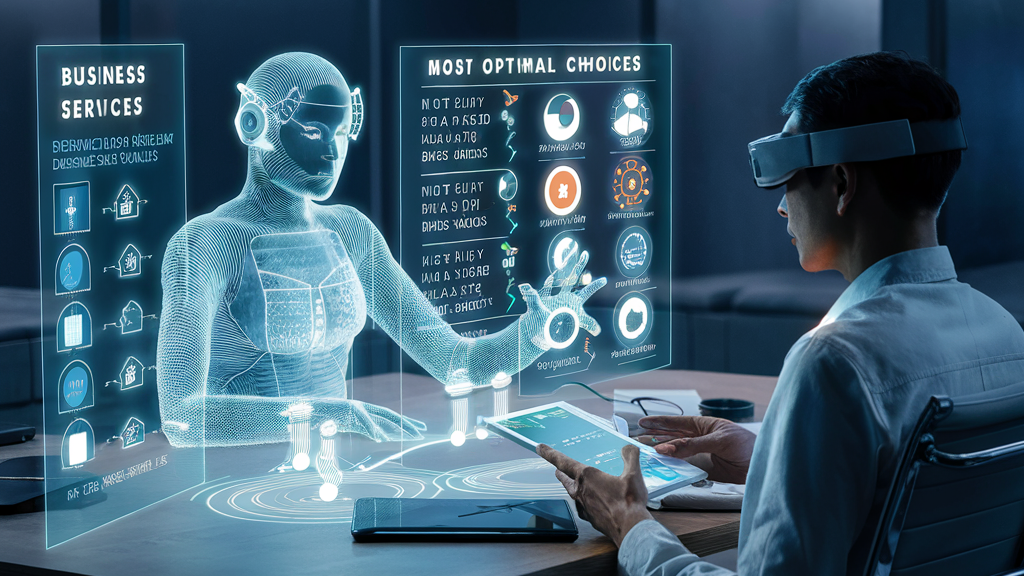
AI Revolutionizes B2B Lead Generation: A Match Made in Marketing Heaven
In the fast-paced world of B2B marketing, generating qualified leads remains a constant challenge. Identifying the right decision-makers, capturing their attention, and nurturing them into loyal customers requires a strategic and targeted approach. This is where Artificial Intelligence (AI) steps in, emerging as a game-changer in the B2B lead generation landscape.
This blog explores the current state of B2B lead generation and how AI is transforming the process. We’ll delve into the specific ways AI can be leveraged to streamline lead generation, boost efficiency, and ultimately drive sales success.
The B2B Lead Generation Challenge: Finding the Right Needles in a Digital Haystack
Traditional lead generation methods like cold calling and generic email blasts are becoming increasingly ineffective in today’s digital age. B2B buyers have grown accustomed to personalized experiences and expect relevant content tailored to their specific needs.
Here’s what makes B2B lead generation challenging:
Complex Buying Journeys: B2B purchases often involve multiple stakeholders with diverse priorities. Identifying the key decision-makers and understanding their pain points requires in-depth research.
Information Overload: B2B buyers are bombarded with marketing messages across various channels. Standing out from the noise and capturing their attention demands a targeted approach with high-value content.
Lead Qualification Bottleneck: Sifting through a pool of unqualified leads consumes valuable time and resources. Filtering out irrelevant prospects allows sales teams to focus on nurturing high-potential leads with a greater chance of conversion.
AI to the Rescue: How It’s Transforming B2B Lead Generation
AI offers a powerful arsenal of tools to address these B2B lead generation challenges. Here’s how:
Smart Lead Identification and Segmentation: AI algorithms can analyze vast datasets to identify ideal customer profiles. By analyzing website behavior, social media engagement, and firmographic data, AI can pinpoint companies that closely resemble your ideal B2B customer. This allows for highly targeted campaigns that resonate with the right audience.
Content Personalization at Scale: AI can create personalized content experiences that cater to specific buyer personas and stages in the buying journey. This might involve tailoring website content, crafting personalized email sequences, or dynamically generating targeted ad copy.
Predictive Lead Scoring: AI can analyze historical data to predict the likelihood of a lead converting into a paying customer. This allows sales teams to prioritize leads based on their conversion potential, ensuring they dedicate their efforts to the most promising prospects.
Chatbots and Conversational AI: AI-powered chatbots can engage website visitors, answer their questions, and qualify leads in real-time. This not only improves the user experience but also provides valuable insights into buyer behavior.
Automated Lead Nurturing: AI can automate email nurturing campaigns, sending relevant content based on a lead’s interests and past interactions. This ensures consistent communication and keeps your brand top-of-mind throughout the buying process.
The Future of B2B Lead Generation: A Human-AI Partnership
While AI is revolutionizing B2B lead generation, it’s important to remember that human expertise remains crucial. The ideal scenario is a collaborative approach where AI handles the heavy lifting of data analysis and automation, freeing up marketing and sales teams to focus on building relationships and closing deals.
Here’s how humans and AI can work together in the future of B2B lead generation:
Strategic Planning: Marketers will continue to set campaign goals, define target audiences, and develop overall lead generation strategies. AI will provide data-driven insights to optimize these strategies for maximum effectiveness.
Creative Content Development: AI can assist with content creation by suggesting topics, optimizing headlines, and analyzing content performance. However, human creativity will still be essential for crafting compelling stories, developing unique brand voices, and building emotional connections with B2B buyers.
Sales Enablement: AI can equip sales teams with valuable insights about leads, including their interests, past interactions, and potential buying signals. However, the human touch will remain vital for building trust, navigating complex negotiations, and closing deals.
Conclusion: Embrace AI to Supercharge Your B2B Lead Generation
The rise of AI in B2B lead generation presents a significant opportunity for businesses to reach the right audience with the right message at the right time. By leveraging AI’s analytical and automation capabilities, B2B marketers can streamline lead generation processes, identify high-potential leads, and ultimately drive sales growth. Remember, AI is a powerful tool, but it’s not a replacement for human expertise. The most successful B2B lead generation strategies will combine the strengths of AI with the creativity and relationship-building skills of experienced marketing and sales professionals.